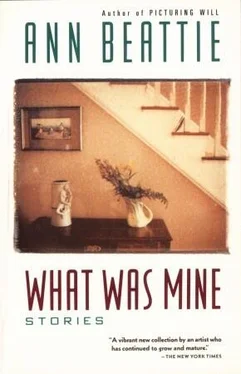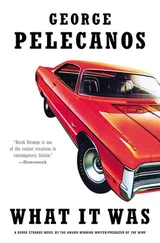Ann Beattie - What Was Mine
Здесь есть возможность читать онлайн «Ann Beattie - What Was Mine» весь текст электронной книги совершенно бесплатно (целиком полную версию без сокращений). В некоторых случаях можно слушать аудио, скачать через торрент в формате fb2 и присутствует краткое содержание. Год выпуска: 1992, Издательство: Vintage, Жанр: Современная проза, на английском языке. Описание произведения, (предисловие) а так же отзывы посетителей доступны на портале библиотеки ЛибКат.
- Название:What Was Mine
- Автор:
- Издательство:Vintage
- Жанр:
- Год:1992
- ISBN:нет данных
- Рейтинг книги:5 / 5. Голосов: 1
-
Избранное:Добавить в избранное
- Отзывы:
-
Ваша оценка:
- 100
- 1
- 2
- 3
- 4
- 5
What Was Mine: краткое содержание, описание и аннотация
Предлагаем к чтению аннотацию, описание, краткое содержание или предисловие (зависит от того, что написал сам автор книги «What Was Mine»). Если вы не нашли необходимую информацию о книге — напишите в комментариях, мы постараемся отыскать её.
What Was Mine — читать онлайн бесплатно полную книгу (весь текст) целиком
Ниже представлен текст книги, разбитый по страницам. Система сохранения места последней прочитанной страницы, позволяет с удобством читать онлайн бесплатно книгу «What Was Mine», без необходимости каждый раз заново искать на чём Вы остановились. Поставьте закладку, и сможете в любой момент перейти на страницу, на которой закончили чтение.
Интервал:
Закладка:
When I started being skeptical of my mother, she began to be skeptical of Herb. I heard arguments about the way he arranged his sets. She said that he should end on a more upbeat note. She thought the lighting was too stagy. He began to play — and end — in a nondescript silver glow. I looked at the shells on the netting, not caring that she knew I wasn’t concentrating on Herb’s playing. She sank lower in the booth, and her attention also drifted: no puffs of smoke carefully exhaled in the pauses between sung phrases; no testing the edge of the table with her fingertip. One Saturday night we just stopped going.
By that time, she had become a loan officer at Riggs Bank. Herb had moved from Sears to Montgomery Ward, where he was in charge of the lawn and leisure-activities section — everything from picnic tables to electric hedge clippers. She served TV dinners. She complained that there wasn’t enough money, though she bought expensive high heels that she wore to work. On Wednesday nights Herb played handball with friends who used to be musicians but who were suddenly working white-collar jobs to support growing families. He would come home and say, either with disbelief or with disorientation, that Sal, who used to play in a Latino band, had just had twins, or that Earl had sold his drums and bought an expensive barbecue grill. She read Perry Mason. He read magazine articles about the Second World War: articles, he said, shaking his head, that were clearly paving the way for a reassessment of the times in which we lived.
I didn’t have a friend — a real friend — until I was fourteen. That year my soul mate was a boy named Ryuji Anderson, who shared my passion for soccer and introduced me to Playboy . He told me to buy Keds one size too large and stuff a sock in the toe so that I could kick hard and the ball would really fly. We both suffered because we sensed that you had to look like John F. Kennedy in order to be John F. Kennedy. Ryuji’s mother had been a war bride, and my mother had lost her husband six years after the war in a freak accident: a painter on scaffolding had lost his footing high up and tumbled backward to the ground, releasing, as he fell, the can of paint that struck my father on the head and killed him. The painter faithfully sent my mother a Christmas card every year, informing her about his own slow recovery and apologizing for my father’s death. Uncle Herb met my mother when his mother, dead of leukemia, lay in the room adjacent to my father’s room in the funeral home. They had coffee together one time when they both were exiled to the streets, late at night.
It was not until a year later, when he looked her up in the phone book (the number was still listed under my father’s name), that he saw her again. That time I went along, and was bought a paper cone filled with french fries. I played cowboy, circling with an imaginary lasso the bench on which they sat. We had stumbled on a carnival. Since it was downtown Washington, it wasn’t really a carnival but a small area of the mall, taken over by dogs who would jump through burning hoops and clowns on roller skates. It became a standing refrain between my mother and Herb that some deliberate merriment had been orchestrated just for them, like the play put on in A Midsummer Night’s Dream .
I, of course, had no idea what to make of the world on any given day. My constants were that I lived with my mother, who cried every night; that I could watch only two shows each day on TV; and that I would be put to bed earlier than I wanted, with a nightlight left burning. That day my mother and Herb sat on the bench, I’m sure I sensed that things were going to be different, as I inscribed two people destined to be together in an imaginary lassoed magic circle. From then on, we were a threesome.
He moved in as a boarder. He lived in the room that used to be the dining room, which my mother and I had never used, since we ate off TV trays. I remember his hanging a drapery rod over the arch — nailing the brackets in, then lifting up the bar, pushing onto it the brocade curtain my mother had sewn, then lowering the bar into place. They giggled behind it. Then they slid the curtain back and forth, as if testing to see that it would really work. It was like one of the games I had had as a baby: a board with a piece of wood that slid back and forth, exposing first the sun, then the moon.
Of course, late at night they cheated. He would simply push the curtain aside and go to her bed. Since I would have accepted anything, it’s a wonder they didn’t just tell me. A father, an uncle, a saint, Howdy Doody, Lassie — I didn’t have a very clear idea of how any of them truly behaved. I believed whatever I saw. Looking back, I can only assume that they were afraid not so much of what I would think as of what others might think, and that they were unwilling to draw me into their deception. Until I wandered into her bedroom, they simply were not going to blow their cover. They were just going to wait for me. Eventually, I was sure to stumble into their world.
“The secret about Uncle Herb doesn’t go any farther than this house,” my mother said that night after I found them together. She was quite ashen. We stood in the kitchen. I had followed her — not because I loved her so much, or because I trusted her, but because I was already sure of Herb. Sure because even if he had winked at me, he could not have been clearer about the silliness of the slammed door. She had on a beige nightgown and was backlit by the counter light. She cast a pondlike shadow on the floor. I would like to say that I asked her why she had lied to me, but I’m sure I wouldn’t have dared. Imagine my surprise when she told me anyway: “You don’t know what it’s like to lose something forever,” she said. “It will make you do anything — even lie to people you love — if you think you can reclaim even a fraction of that thing. You don’t know what fraction means. It means a little bit. It means a thing that’s been broken into pieces.”
I knew she was talking about loss. All week, I had been worried that the bird at school, with its broken wing, might never fly again and would hop forever in the cardboard box. What my mother was thinking of, though, was that can of paint — a can of paint that she wished had missed my father’s head and sailed into infinity.
We looked down at the sepia shadow. It was there in front of her, and in front of me. Of course it was behind us, too.
Many years later, the day Herb took me out for “a talk,” we drove aimlessly for quite a while. I could almost feel Herb’s moment of inspiration when it finally came, and he went around a traffic circle and headed down Pennsylvania Avenue. It was a Saturday, and on Saturdays the Merry Mariner was open only for dinner, but he had a key, so we parked and went inside and turned on a light. It was not one of those lights that glowed when he played, but a strong, fluorescent light. Herb went to the bar and poured himself a drink. He opened a can of Coke and handed it to me. Then he told me that he was leaving us. He said that he himself found it unbelievable. Then, suddenly, he began to urge me to listen to Billie Holiday’s original recordings, to pay close attention to the paintings of Vermeer, to look around me and to listen. To believe that what to some people might seem the silliest sort of place might be, to those truly observant, a temporary substitute for heaven.
I was a teenager, and I was too embarrassed to cry. I sat on a bar stool and simply looked at him. That day, neither of us knew how my life would turn out. Possibly he thought that so many unhappy moments would have damaged me forever. For all either of us knew, he had been the father figure to a potential hoodlum, or even to a drifter — that was what the game of pretense he and my mother had been involved in might have produced. He shook his head sadly when he poured another drink. Later, I found out that my mother had asked him to go, but that day I didn’t even think to ask why I was being abandoned.
Читать дальшеИнтервал:
Закладка:
Похожие книги на «What Was Mine»
Представляем Вашему вниманию похожие книги на «What Was Mine» списком для выбора. Мы отобрали схожую по названию и смыслу литературу в надежде предоставить читателям больше вариантов отыскать новые, интересные, ещё непрочитанные произведения.
Обсуждение, отзывы о книге «What Was Mine» и просто собственные мнения читателей. Оставьте ваши комментарии, напишите, что Вы думаете о произведении, его смысле или главных героях. Укажите что конкретно понравилось, а что нет, и почему Вы так считаете.












